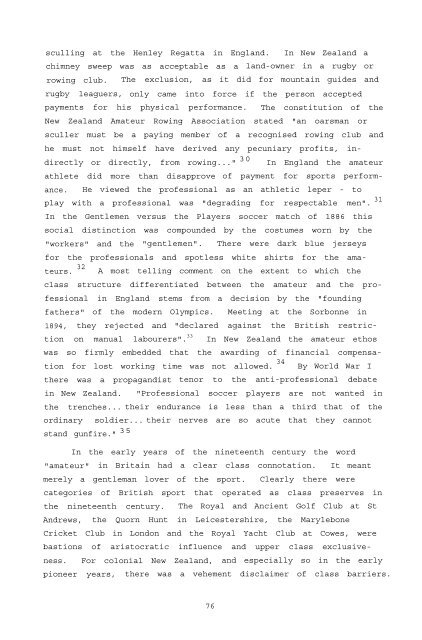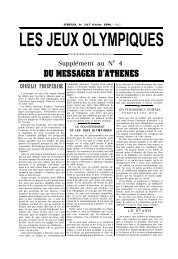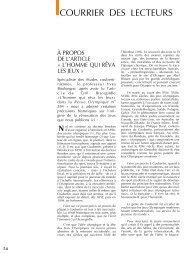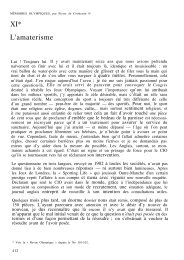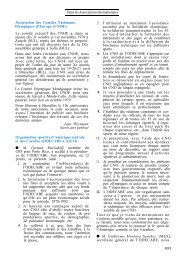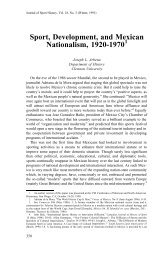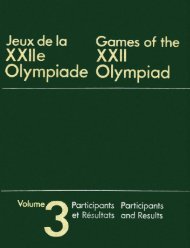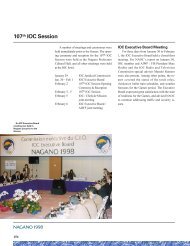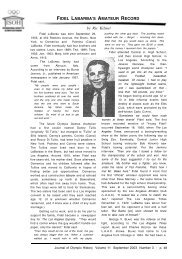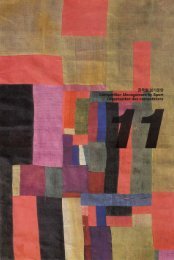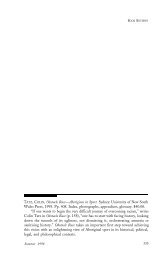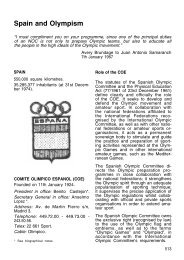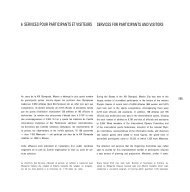Sport and Colonialism in 19th Century Australasia - LA84 Foundation
Sport and Colonialism in 19th Century Australasia - LA84 Foundation
Sport and Colonialism in 19th Century Australasia - LA84 Foundation
You also want an ePaper? Increase the reach of your titles
YUMPU automatically turns print PDFs into web optimized ePapers that Google loves.
scull<strong>in</strong>g at the Henley Regatta <strong>in</strong> Engl<strong>and</strong>. In New Zeal<strong>and</strong> a<br />
chimney sweep was as acceptable as a l<strong>and</strong>-owner <strong>in</strong> a rugby or<br />
row<strong>in</strong>g club. The exclusion, as it did for mounta<strong>in</strong> guides <strong>and</strong><br />
rugby leaguers, only came <strong>in</strong>to force if the person accepted<br />
payments for his physical performance. The constitution of the<br />
New Zeal<strong>and</strong> Amateur Row<strong>in</strong>g Association stated "an oarsman or<br />
sculler must be a pay<strong>in</strong>g member of a recognised row<strong>in</strong>g club <strong>and</strong><br />
he must not himself have derived any pecuniary profits, <strong>in</strong>directly<br />
or directly, from row<strong>in</strong>g..." 30<br />
In Engl<strong>and</strong> the amateur<br />
athlete did more than disapprove of payment for sports perform-<br />
ance. He viewed the professional as an athletic leper - to<br />
play with a professional was "degrad<strong>in</strong>g for respectable men". 31<br />
In the Gentlemen versus the Players soccer match of 1886 this<br />
social dist<strong>in</strong>ction was compounded by the costumes worn by the<br />
"workers" <strong>and</strong> the "gentlemen". There were dark blue jerseys<br />
for the professionals <strong>and</strong> spotless white shirts for the amateurs.<br />
32<br />
A most tell<strong>in</strong>g comment on the extent to which the<br />
class structure differentiated between the amateur <strong>and</strong> the professional<br />
<strong>in</strong> Engl<strong>and</strong> stems from a decision by the "found<strong>in</strong>g<br />
fathers" of the modern Olympics. Meet<strong>in</strong>g at the Sorbonne <strong>in</strong><br />
1894, they rejected <strong>and</strong> "declared aga<strong>in</strong>st the British restriction<br />
on manual labourers". 33<br />
In New Zeal<strong>and</strong> the amateur ethos<br />
was so firmly embedded that the award<strong>in</strong>g of f<strong>in</strong>ancial compensation<br />
for lost work<strong>in</strong>g time was not allowed. 34<br />
By World War I<br />
there was a propag<strong>and</strong>ist tenor to the anti-professional debate<br />
<strong>in</strong> New Zeal<strong>and</strong>. "Professional soccer players are not wanted <strong>in</strong><br />
the trenches... their endurance is less than a third that of the<br />
ord<strong>in</strong>ary soldier... their nerves are so acute that they cannot<br />
st<strong>and</strong> gunfire." 35<br />
In the early years of the n<strong>in</strong>eteenth century the word<br />
"amateur" <strong>in</strong> Brita<strong>in</strong> had a clear class connotation. It meant<br />
merely a gentleman lover of the sport. Clearly there were<br />
categories of British sport that operated as class preserves <strong>in</strong><br />
the n<strong>in</strong>eteenth century. The Royal <strong>and</strong> Ancient Golf Club at St<br />
Andrews, the Quorn Hunt <strong>in</strong> Leicestershire, the Marylebone<br />
Cricket Club <strong>in</strong> London <strong>and</strong> the Royal Yacht Club at Cowes, were<br />
bastions of aristocratic <strong>in</strong>fluence <strong>and</strong> upper class exclusiveness.<br />
For colonial New Zeal<strong>and</strong>, <strong>and</strong> especially so <strong>in</strong> the early<br />
pioneer years, there was a vehement disclaimer of class barriers.<br />
76


